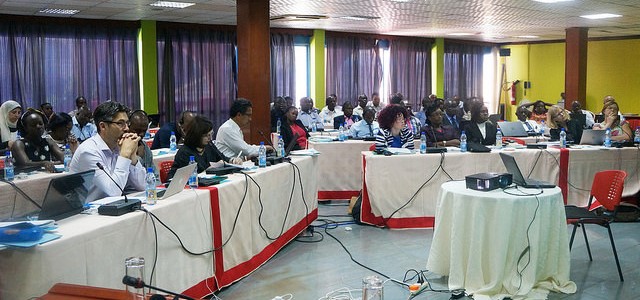The goal of GWP in this regard is to act as a neutral platform supporting the
planning, technical, and financial capacities of actors and governmental
entities that are engaged in managing transboundary water resources.
Objectives and Expected Results
The primary objective of the capacity building initiative in international water law (IWL) is to facilitate good water governance through strengthening technical and institutional capacities of agencies and individuals that can influence and advise decision-makers on negotiation, adoption, and implementation of legal frameworks for water management. The training is designed to increase knowledge about different approaches and tools related to transboundary water management. The IWL training aims to build capacity in the following specific areas:
- Strengthen capacities of regional basin organisations and national governments in the development and effective implementation of existing and future legal frameworks that will contribute to water security, sustainable development, equitable benefit sharing, and peace.
- Establish and develop a network of experts and institutions that are involved in the design, adoption, and implementation of legal frameworks.
- Strengthen a gender-equal approach to capacity building in international water law and transboundary water governance.
- Provide participants with tools to integrate the SDGs (6.5) to improve transboundary water cooperation (indicator 6.5.2).
- Enhanced negotiation skills of individuals, agencies, and organizations involved in discussions and decision-making processes related to the adoption of water-related treaties, as well as their implementation.
- Linking international water law to bridging regional economic communities and basin organisations.
Scope
So far the international water law training courses have been carried out in Latin America and Africa. Since 2015, trainings in Africa have been held at Makerere University in Kampala, Uganda. Regional trainings for Latin America have taken place in Colombia, Peru, Honduras, Brazil, and some online training sessions have been recently delivered as well.
Partners
The training courses in IWL are organised by GWP but carried out in collaboration with a range of international, regional, and local organisations. Collaborating partners include: the Intergovernmental Authority on Development (IGAD), the African Network for Basin Organizations (ANBO), Makerere University, University of Dundee, International Water Management Institute (IMWI), SITWA Project (Strengthening Institutions for Transboundary Water Resources Management in Africa), Cap-Net, LA-WETnet (Latin American Water Education and Training Network).
Target Audience
Primary candidates for the IWL training are mid- to high-level practitioners and professionals from basin organisations and governments who have a role in negotiating, drafting, or reforming treaties and laws, and those making decisions on transboundary waters. An example of the full list of participants to one of our latest training sessions in Africa can be found here.
Delivery Methods
The international water law training course is normally 1-3 day(s), but online training has also been held. During the course the areas of IWL that are focused on include the role and relevance of IWL; procedural rules; institutional arrangements; dispute settlement mechanism and transboundary aquifers. Participants undergo training on negotiations of a treaty arrangement. Furthermore, the training is sometimes linked to a particular water related Sustainable Development Goal or to a GWP thematic programme. An alumni network has been established for collaboration and knowledge exchange across the regions where the capacity building initiatives are being carried out.

